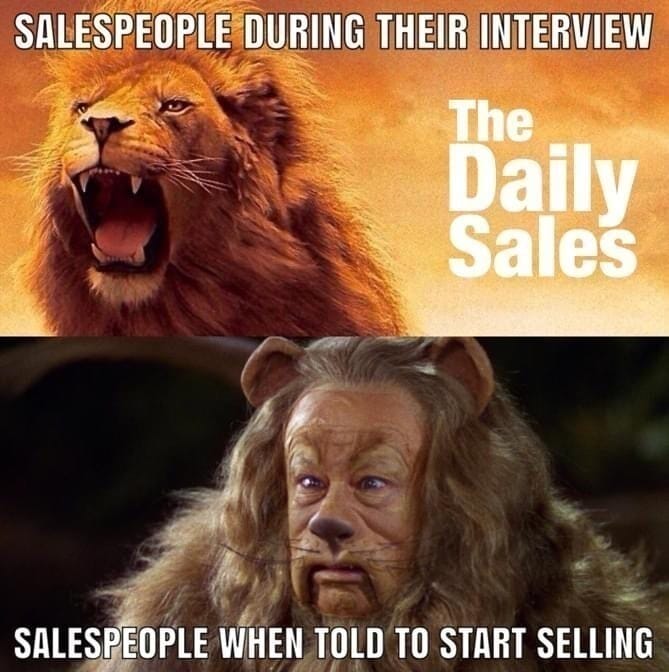- SalesDaily Newsletter
- Posts
- ✨ magic disco questions
✨ magic disco questions
Turn business cases using discovery questions
Daily Sales Newsletter September 09, 2025 |
|
Welcome - this is your daily dose of sharp, tactical sales advice.
Want your team on SalesDaily? Just forward this email and tell them to subscribe here.
Chris Orlob: Questions that expose hidden blockers
Matt Macnamara: Apply labels to spark deal urgency
Keith Weightman: Upgrade any discovery questions
Mor Assouline: Connect features with business value
Upgrade to Premium
Access the full SalesDaily archive with effective discovery strategies.
For example these recent NL issues:
Get access on these PREMIUM resources:
Questions that expose hidden blockers
Chris Orlob explains how the strongest discovery questions aren’t flashy. They’re strategically precise, layered ones that uncover how deals are really getting done:
1. “Can you walk me through what’s needed for a yes/no decision?”
➤ Majority of sellers question: “What’s your decision process?”
➤ This version outlines next steps, not assumed generalities.
➤ Move from guesses to a playbook of how decisions are made.
2. “Who’s getting involved for each step? How are they engaged?”
📌 Timing matters. Ask for it too early and it feels intrusive.
📌 Ask it after step one, when it’s the obvious next question.
📌 Strategize around decision-makers and their stage roles.
3. “What do the stakeholders have to say about the options?”
❖ This uncovers individual decision criteria at play for authorities.
❖ Every stakeholder has various concerns for their departments.
❖ Asking for help allows you to customize your pitch for approval.
4. “What timetable is driving you to take each of those steps?”
✔ Asking for timelines gets weak answers like “somewhere this quarter.”
✔ This connects milestones with internal drivers for building urgency.
5. “How are you thinking about funding projects if we get far?”
👉 When asked in isolation, this question feels aggressive.
👉 But stacked after these questions, it’s a natural progression.
👉 Adding “if we get that far” softens their defense approach.
👉 You’re getting clarity on whether money’s available for use.
Forecast accurately, build strategies, and minimize surprises.
Apply labels to spark deal urgency
Matt Macnamara breaks down how to run discovery calls that get answers instead of surface-level replies. Focus on powerful discovery questions that make everything work:
1. What do you hope to accomplish?
➤ Prospects answer with features instead of challenges.
➤ That’s useful, but you miss the actual impact needed.
Follow up with:
“Curious, what’s the original problem making you think: we need to solve this?”
➤ This uncovers challenges, along with consequences.
2. Are these your main challenges?
💬 Prospects usually bury the urgent challenges instead of solving them.
💡 Ask:
“Is this challenge the one we should be discussing? Are there others that are hidden?”
💡 Peel back further with: “Can you elaborate further on that specific problem?”
💬 This keeps you aligned with priorities instead of solving the wrong ones.
3. Why are your solving this now?
❖ Your deals stall when urgency is missing.
Use: “What’s prompting you to solve this now rather than later?”
If downplayed, label: “Sounds like this isn’t a priority right now.”
❖ The prospect often corrects you, building urgency.
4. What did that meeting sound like?
Question more about:
“You must have tried solving these problems before. What did that meeting sound like?”
➔ This question stops prospects and gets them storytelling.
Essential follow-up: “When did you start realizing this was becoming a problem?”
➔ Stories reveal context, emotion, and stakes: the primary need for selling.
Technique upgrades
Start questions with:
✔ “Can you walk me through…”
✔ “Can you help me understand…”
✔ “Can you tell me about…”
↳ These signal you’re looking for detailed responses.Turn closed into open: Add “To what extent” before asking yes/no questions.
Example: Instead of “Can you protect against phishing?”
↳ Ask this question instead: “To what extent can you protect against phishing?”
Upgrade any discovery questions
Keith Weightman discusses that high-performing reps ask for hyper-specific questions, forcing your prospects to give detailed, useful answers instead of broad responses.
Current situation
Start by identifying where delays happen in their workflows.
🔑 General: “What’s your sales process like?”
🔑 Specific: “Looking at your 5-stage sales process, which stage usually has the longest duration for enterprise deals?”
⇒ Moves your conversation from vague overviews to precise bottlenecks.
Main problems
Observe manual tasks slowing down everyone involved.
General: “Do you have reporting challenges?”
Specific: “When your CRO requests pipeline data before a meeting, what specific manual steps does your sales operations team handle that take most of your time?”
⇒ Surfaces actual workflow problems, not just yes/no answers.
Key consequence
Connect the problem directly to your business outcomes.
✱ General: “Is this affecting productivity?”
✱ Specific: “How did the 30-minute delay in CRM updates impact your ability to follow up with high-intent leads within your target 1-hour window?”
⇒ Connects the problem directly to your lost opportunities.
Conclusion
Imagine how solving your challenges accelerates priorities.
🎤 General: “Would faster reporting help?”
🎤 Specific: “If your regional directors could access territory performance data every day instead of weekly, which of your Q3 priorities would advance faster?”
⇒ Pushes your buyers to visualize impact on priorities and urgency.
Change the questions you’re asking to make details hyper-specific.
TO-GO
Mor Assouline: Connect features with business value
Sean Gentry: Great sellers discover issues with respect
Aaron Margolis: Mindset change for discovery success
Mike Gallardo: Discovery questions that build urgency
Partnering with these newsletters:
The Follow Up: We talk about Sales like your friend, not your manager
Big Desk Energy: Startup stories and lessons
B2B Whales: Proven B2B sales strategies
Creator Spotlight: Grow with social media and newsletters
Check them out!
QUOTE OF THE DAY
"Bad things happen when we turn initial discovery meetings into monologues and presentations."
PODCASTS
HUMOR

P.S. Get access to all my premium resources and infographics - subscribe to Premium.




Reply